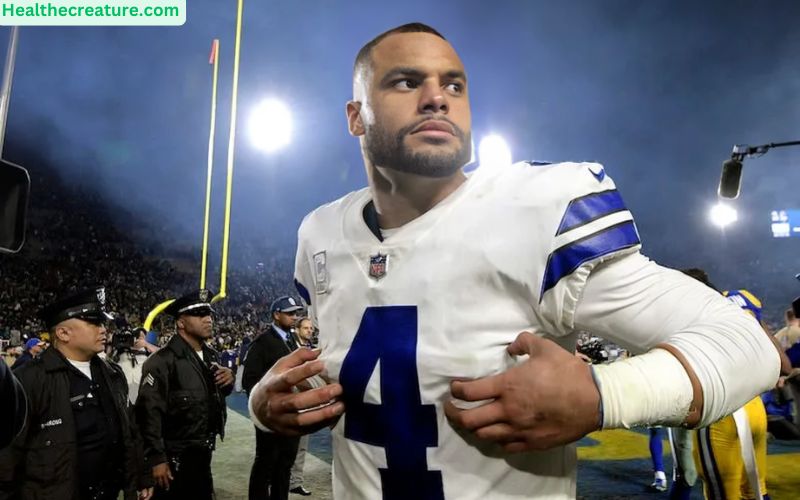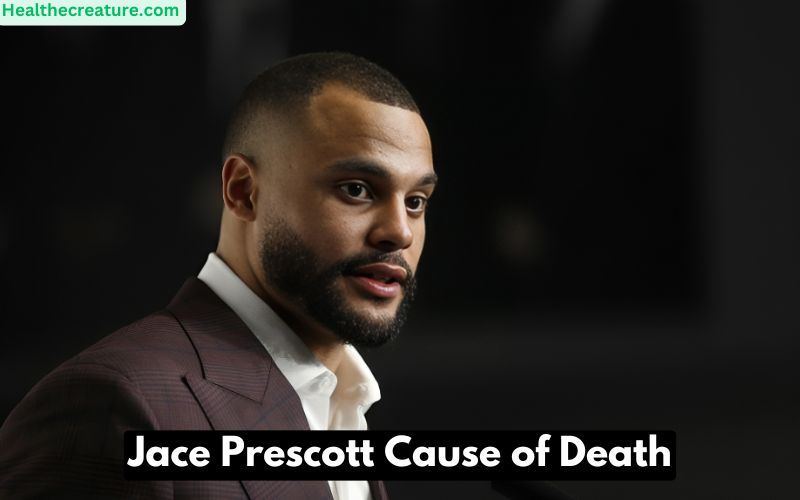Jace Prescott, the older brother of NFL star Dak Prescott, tragically passed away at the age of 31 in April 2020. His death left the Prescott family, fans, and the sports community in mourning. While much of the attention initially focused on the impact of his passing on Dak Prescott, a deeper examination of Jace’s life and the circumstances surrounding his death reveals a story that resonates far beyond football.
Understanding Jace Prescott’s Life and Legacy
Jace Prescott was more than just the brother of a famous athlete. Born in Haughton, Louisiana, Jace grew up in a tight-knit family with Dak and their other sibling, Tad. Sports were a major part of their upbringing, and Jace, like Dak, pursued football passionately. He played as an offensive lineman at Northwestern State University, where his physical prowess and dedication made him a standout player.
Beyond his athletic endeavors, Jace was known for his warm personality and deep connections with his family. He had a protective nature, often stepping into the role of a mentor for his younger brothers. His bond with Dak was particularly strong, and their shared experiences on and off the field formed the foundation of a relationship built on mutual respect and love.
The Announcement of Jace Prescott’s Death

On April 23, 2020, the news of Jace Prescott’s death broke, shocking fans and the broader community. The Prescott family issued a statement expressing their grief and asking for privacy during an incredibly difficult time. The Dallas Cowboys, Dak Prescott’s team, also released a heartfelt statement, extending their condolences to the Prescott family.
The timing of Jace’s death, during the peak of the COVID-19 pandemic, meant that public mourning and gatherings were significantly restricted. Despite this, an outpouring of support from fans and the sports world flooded social media, reflecting the profound impact Jace and his family had on those around them.
Cause of Death: Shedding Light on Mental Health
It was later revealed that Jace Prescott died by suicide. This revelation brought a spotlight to the importance of mental health and the struggles individuals face, often in silence. In an interview, Dak Prescott spoke candidly about his brother’s struggles with mental health, describing the immense pain and burden Jace carried.
Dak explained that Jace had been deeply affected by the loss of their mother, Peggy Prescott, who passed away in 2013 after battling colon cancer. Peggy was the backbone of the Prescott family, and her death left a lasting void in their lives. Jace, in particular, found it difficult to cope with the loss, and his grief compounded over the years.
Mental Health in the Spotlight
Jace Prescott’s death underscored the pressing need to address mental health issues, particularly among men and within the sports community. Society often places unrealistic expectations on men to be strong and stoic, discouraging them from expressing vulnerability or seeking help. For athletes, the pressure to perform and maintain a tough exterior can exacerbate these challenges.
Dak Prescott’s decision to speak openly about Jace’s struggles and his own battles with depression was a pivotal moment in the conversation about mental health. By sharing his personal experiences, Dak helped break the stigma surrounding mental health issues and encouraged others to seek support when needed.
The Role of Family and Grief in Mental Health
The Prescott family’s journey highlights the complexities of grief and its impact on mental health. The death of Peggy Prescott not only altered the family dynamic but also left each member to navigate their loss in their own way. For Jace, who was particularly close to their mother, the grief was profound and enduring.
Studies have shown that unresolved grief can lead to a range of mental health issues, including depression, anxiety, and suicidal ideation. The Prescott family’s story serves as a reminder of the importance of supporting loved ones through their grieving process and recognizing when professional help may be necessary.
Breaking the Silence Around Suicide
Suicide remains a deeply stigmatized topic, often surrounded by misconceptions and shame. However, discussing the realities of suicide and mental health is crucial to fostering understanding and prevention. The circumstances of Jace Prescott’s death offer an opportunity to educate others about the warning signs of suicide and the resources available to those in need.
Some common signs of suicidal ideation include withdrawal from social activities, changes in behavior or mood, expressing feelings of hopelessness, and talking about death or self-harm. It is essential for family members, friends, and communities to remain vigilant and proactive in offering support to individuals who may be struggling.
The Impact of Jace Prescott’s Death on Dak Prescott
Jace’s death had a profound impact on Dak Prescott, both personally and professionally. As the quarterback for the Dallas Cowboys, Dak has faced immense pressure and scrutiny throughout his career. Losing his brother added another layer of emotional complexity to his life, testing his resilience and strength.
In interviews following Jace’s death, Dak spoke about the challenges of balancing his grief with his responsibilities as a team leader. He acknowledged that seeking therapy and opening up about his feelings were crucial steps in his healing process. Dak’s vulnerability not only helped him cope but also inspired others to prioritize their mental well-being.
The Broader Implications for the Sports World
The death of Jace Prescott resonated deeply within the sports world, prompting discussions about the mental health challenges athletes face. While professional sports often emphasize physical fitness and performance, mental health is an equally critical component of overall well-being. The pressures of competition, public scrutiny, and the demands of a high-profile career can take a significant toll on an athlete’s mental state.
In recent years, more athletes have begun to speak out about their mental health struggles, advocating for greater awareness and resources. Jace’s story added to this growing movement, emphasizing the need for comprehensive support systems within the sports industry.
Honoring Jace Prescott’s Memory
In the wake of Jace’s passing, the Prescott family has worked to honor his memory by raising awareness about mental health and suicide prevention. Dak Prescott, in particular, has used his platform to advocate for these causes, partnering with organizations and sharing his story to help others.
Jace’s legacy lives on through the lives he touched and the important conversations his story has sparked. By shedding light on the realities of mental health struggles, the Prescott family has turned their pain into a force for positive change.
Resources and Support for Mental Health
The tragic loss of Jace Prescott serves as a reminder of the importance of mental health resources and support. For those struggling with mental health issues or suicidal thoughts, reaching out for help can be a life-saving step. Organizations such as the National Suicide Prevention Lifeline and the Crisis Text Line provide free, confidential support 24/7.
Additionally, fostering open conversations about mental health within families, workplaces, and communities can help reduce stigma and create a culture of understanding and compassion.
A Call to Action
Jace Prescott’s death is a heartbreaking reminder of the challenges many individuals face in silence. His story highlights the urgent need for greater awareness, education, and resources to address mental health issues and prevent suicide. It also serves as a call to action for society to break the stigma surrounding mental health and create a supportive environment for those in need.
As the Prescott family continues to navigate their grief, their resilience and advocacy offer hope and inspiration to others facing similar struggles. By honoring Jace’s memory and sharing their story, they have transformed their loss into a powerful force for change, ensuring that his legacy will endure.
See Also: Bob Marley Cause of Death
FAQs
Who was Jace Prescott?
Jace Prescott was the older brother of NFL quarterback Dak Prescott. He was a former football player who played as an offensive lineman at Northwestern State University. Jace was known for his protective and loving nature, his dedication to his family, and his close bond with his siblings.
What was the cause of Jace Prescott’s death?
Jace Prescott tragically died by suicide in April 2020. His passing brought attention to the importance of mental health and the struggles many individuals face, often in silence.
How did Jace Prescott’s death impact the Prescott family?
Jace’s death was a devastating loss for the Prescott family. His passing, combined with the earlier loss of their mother, Peggy Prescott, deeply affected the family. Dak Prescott, in particular, has spoken openly about how the loss of his brother and mother influenced his mental health journey.
Why is Jace Prescott’s death significant in discussions about mental health?
Jace Prescott’s death highlighted the need for greater awareness and understanding of mental health issues, especially among men. His story has been used to emphasize the importance of seeking help, breaking the stigma surrounding mental health, and fostering supportive environments.
What role did Dak Prescott play in raising awareness about mental health after Jace’s death?
Dak Prescott has been a vocal advocate for mental health awareness since his brother’s passing. By sharing his personal struggles with depression and the impact of Jace’s death, Dak has helped bring attention to the importance of mental well-being and encouraged others to seek help when needed.
Conclusion
Jace Prescott’s tragic death serves as a poignant reminder of the importance of mental health awareness and support. His story underscores the need for open conversations, accessible resources, and breaking the stigma surrounding mental health struggles. Through advocacy and awareness, his legacy continues to inspire change and offers hope to those facing similar challenges


